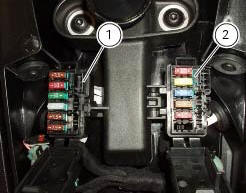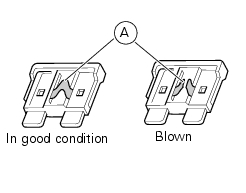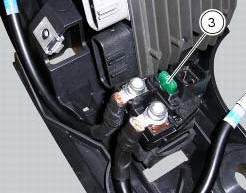
Ducati Diavel Service Manual: Checking the fuses
The main fuse box (1) and the secondary one (2) are located in the tool tray; to reach the fuse box remove the seat as specified under sect. 5 - 3 "Removal of the seat".
The fuses are accessed by removing the cover, which shows the ampere ratings and mounting locations.
For ampere ratings, refer to the chapter "routing of wiring on frame", sect. 6 - 1.
Important
Before replacing a damaged fuse with a new one of the same rating, identify the cause of the problem.
A blown fuse can be identified by the breakage of inner filament (a).


Important
Switch the ignition key to off before replacing a fuse to avoid possible short circuits.
Warning
Never use a fuse with a rating other than the specified value. Failure to observe this rule may damage the electric system or even cause fire.
Besides the fuses inside the box, the motorcycle is also provided with one 30 a fuse (3), located near the voltage regulator (in the electrical components compartment) that protects the electronic rectifier (sect. 6 - 2, Rectifierregulator).

 Checking protection and safety device components
Checking protection and safety device components
Checking the side stand switch
Remove the switch (1) from the side stand undoing screw (2) and disconnect
the main wiring connector from the switch
(see paragraph "routing of wiring on frame", sec ...
 Instruments
Instruments
...
Other materials:
Refitting the timing gears
Before reassembling the removed parts, check timing gears (13) for wear.
Change, if necessary.
Important
The timing gears (13) must always be renewed as a pair.
Refitting is the reverse of removal.
Warning
When introducing the driven gear (b) check that the tongue (15) is
correctly fitted o ...
Riding style function (riding style change)
This function changes the motorcycle riding style.
Each riding style is associated with a different intervention
level of the traction control (dtc - ducati traction control)
and different engine power and output.
To change the motorcycle riding mode, press the reset
button once (12, fig. 1 ...
Engine start button
Introduction
The engine start button is located on the right hand handlebar switchgear set
and is used to turn the engine on.
Component assembling position
The engine start button is included in the switchgear set on the right hand
handlebar.
Location of right hand handlebar switchge ...